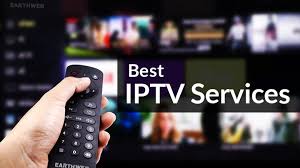In recent years, the way we consume television has undergone a significant transformation. Traditional cable TV is being replaced by innovative technologies that offer more flexibility and content variety. One such technology is IPTV (Internet Protocol Television), which is revolutionizing how people access television programs, movies, and live broadcasts. IPTV offers a more iptv aanbieder nederland and versatile viewing experience by delivering content over the internet rather than through conventional satellite or cable signals.
What is IPTV?
IPTV stands for Internet Protocol Television. It is a digital television service that transmits television signals over the internet using the same protocol that is used for streaming data. Instead of relying on satellite dishes or cables, IPTV streams content via a broadband internet connection. This allows for a more flexible, on-demand viewing experience.
There are three main types of IPTV services:
- Live TV
This includes streaming live television channels just like traditional TV broadcasts, with the added benefit of being accessible from any internet-enabled device. - Video on Demand (VOD)
IPTV services also allow users to access movies, TV shows, and other media content whenever they choose, much like other streaming platforms such as Netflix or Hulu. - Time-Shifted TV
Time-shifting allows viewers to watch shows and movies they missed by recording them for later viewing. Users can pause, rewind, and fast forward through live content.
Benefits of IPTV
IPTV offers numerous advantages over traditional cable or satellite television. Some of the key benefits include:
- Wide Variety of Content
With IPTV, viewers can access a vast range of channels and on-demand content from across the globe. You’re not limited to regional or local programming – IPTV offers global channels, niche interests, sports broadcasts, and exclusive content tailored to individual preferences. - Flexibility and Convenience
IPTV lets you watch your favorite shows or sports events on any device – from smartphones, tablets, and smart TVs to laptops and desktop computers. This level of convenience allows users to watch content from anywhere, as long as they have a stable internet connection. - On-Demand Viewing
One of the most attractive features of IPTV is the ability to watch shows and movies at your convenience. Whether you’re catching up on missed episodes or binge-watching your favorite series, IPTV gives you the flexibility to watch whenever you want. - Interactive Features
Many IPTV services offer interactive features such as video on demand, live sports statistics, chat, and even social media integration. Users can interact with the content, access additional information, or engage with other viewers in real time. - Cost-Effective
Traditional cable or satellite TV services often come with hefty monthly bills, including fees for channels you might not even watch. IPTV typically offers more flexible pricing structures, allowing customers to choose packages based on their interests. Plus, with the ability to watch on multiple devices, there’s no need for additional equipment like cable boxes. - Higher Quality Streams
IPTV generally provides high-definition (HD) or 4K quality content, depending on the service provider and your internet speed. This means a superior viewing experience, especially for high-definition broadcasts like live sports or movies.
How Does IPTV Work?
IPTV works by converting television signals into data packets and then transmitting them over the internet. Here’s a simplified breakdown of the process:
- Content Source
IPTV content is typically sourced from broadcasters, studios, or content providers who encode the video signals into digital data formats. - Data Transmission
This data is then sent over the internet via broadband connections using the IP protocol (Internet Protocol). Unlike traditional satellite or cable TV, IPTV doesn’t rely on coaxial cables or satellite dishes, but instead uses fiber optic or DSL broadband connections to transmit the content. - Decoder
The data packets are received by an IPTV set-top box or a compatible device (such as a smart TV or mobile phone). The device decodes the digital data and presents it to the user as a seamless video stream. - Viewing
Finally, the viewer can watch the content in real-time or on-demand through their connected device.
Popular IPTV Providers
Several providers offer IPTV services to consumers, each with its unique offerings and pricing models. Some popular IPTV services include:
- YouTube TV
YouTube TV offers live TV streaming, including popular channels, and on-demand content. It also provides cloud DVR capabilities and is known for its user-friendly interface. - Sling TV
Sling TV offers customizable packages that allow users to select channels based on their preferences. It is an affordable option with a wide range of content. - Hulu + Live TV
Hulu offers both on-demand content and live TV streaming, making it a versatile choice for users looking for a comprehensive entertainment package. - AT&T TV Now
AT&T’s IPTV service offers a variety of live TV channels, along with the ability to stream movies and shows on demand. - Xfinity X1
Comcast’s Xfinity X1 combines traditional cable TV with IPTV features, allowing users to access live TV, on-demand content, and even apps like Netflix.
Is IPTV Legal?
IPTV services are legal when they are provided by licensed and authorized service providers. However, there are illegal IPTV services that offer access to pirated content. Users should always ensure they are subscribing to legitimate IPTV providers to avoid potential legal issues.
Conclusion
IPTV is undoubtedly the future of television viewing. It offers unmatched flexibility, variety, and convenience, making it a popular choice among tech-savvy consumers. Whether you are looking for a live TV experience, on-demand movies, or sports streaming, IPTV can provide a customized solution to fit your entertainment needs. As the technology continues to evolve, IPTV will likely become an even more dominant force in the television industry, reshaping the way we consume media.
